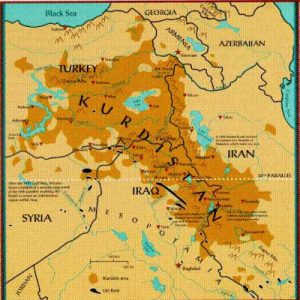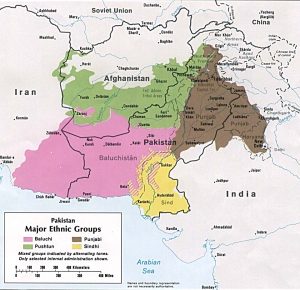Just as the Jewish people were left without a Jewish state for thousands of years and occupied by others, from the Romans to the Byzantines to the Ottomans, the Kurdish and Balochi people are nations without a country. The land of Kurds is divided between Turkey, Iran, Iraq, and parts of Syria, Armenia and Azerbaijan, while the Balochis reside in Pakistan, Afghanistan and Iran. Just as the Jewish people never gave up on the Jewish state of Israel, the Kurds and Balochis have never been willing to give up their dream of creating greater Kurdistan, which comprises parts of Iran, Iraq, Syria and Turkey.
The Ottomans captured Vedr-Khan-Bek, the Kurdish area of the Middle East, in 1843 which which led to a Kurdish uprising four years later, resulting in oppression of the Kurds and the formation of the national Kurdish movement in 1908. After World War II, American and Soviet influences became the cause of division in the middle east, as there were countries under American military control and many under Soviet military control causing both internal and external strife for many newly formed nations. The Iranian portion of Kurdistan (as portrayed in the image above) fell under Soviet occupation. The Soviets withdrew their forces from the area in 1947, and the Iranian government, backed by the US and Great Britain, destroyed the Kurdish republic and executed the leaders in an effort to ensure the Kurds would not revolt and take control of the oil rich land. In 1975 Saddam Hussein, the leader of Iraq, started bombing Kurdish villages, destroying an estimated 5,000 villages by 1980. Ultimately, the Kurdish nations remains resilient in their continued effort to fight for their independence. (Click here for more information about the occupation of Kurdistan).
During this time, the British occupied western Balochistan and were urging Pakistan to invade and conquer the remaining independent Balochi land in order to crush the nationalists and pro-Soviet forces. In 1948, Pakistan attacked Balochistan, occupied the land, looted its natural resources , and suppressed the Balochi language and culture in classic colonialist style. Under the Pakistani occupation, Thousands of Baloch people have been massacred, hundreds of thousands made refugees, and thousands more have disappeared or been tortured and jailed, often without trial. Details of Pakistan’s human rights abuses in Balochistan are well documented by Pakistani and international human rights groups, including the Human Rights Commission of Pakistan (see two HRCP reports here and here).
The Kurdish and Balochi dedication to reclaim their land where they could live in peace is similar to that of the Jewish peoples’ determination to fight and defend Israel with all their might. The Jews, Baloch, and Kurds both have a long history of fighting much stronger opponents. Over the years, the two nations have been courageously fighting against powerful countries and mutual enemies of Israel, including Turkey, Iran, Syria, Iraq, and Pakistan. These countries have resorted to brutal use of force to suppress the Kurdish and Balochi national movements, but they have failed to do so.
Dr. Jacques Neriah, a special Lebanese analyst for the Middle East at the Jerusalem Center for Public Affairs, former Foreign Policy Advisor to Israeli Prime Minister Yitzhak Rabin, and Deputy Head for Assessment of Israeli Military Intelligence, explained in a 2013 interview with Mohammed Hussein, journalist for the Awene newspaper, that a moral relationship between Israel and the Kurds could only benefit the Jewish state. He pointed out that “Israel has never missed an opportunity to encourage the establishment of a Kurdish homeland. Our prime ministers were all loyal to that pledge, because it is morally just and politically a must…Kurdistan is very important strategically since it is at the heart of the Middle East and a bridge between the Middle East and the Asian states. Moreover there is a common destiny between Jews and Kurds that has always existed and creates special bonds with Israel.”
Iran, Iraq, Syria, Turkey, and Pakistan are all concerned that if there were an independent Kurdish state, then the Kurdish and Balochi rebels in their own countries– who are mistreated and upset with their respective governments–, will be motivated to attack Iran, Syria, and Turkey once they become independent. Moreover, the Kurd uprising has already proved to be very costly for Turkey. The rising tension between the Kurds and Syrians on the Turkish side of the Syrian border is a huge threat to Turkey’s tourism industry. Additionally, human right abuses, including the use terrorism laws to prosecute and prolong incarceration of thousands of Kurdish political activists, human rights defenders, students, journalists, and trade unionists, have affected Turkey’s reputation in the international community; this has resulted in the country’s lack of permanent membership in the European Union.
The Kurds now battle and resist the militants of the Islamic State in Iraq and Syria (ISIS), a Sunni terrorist organization fighting with the ambition to capture whole Iraq. The victory of ISIS, which believes in a global Islamic caliphate, a belief that the world should be led by a supreme religious and political leader known as a caliph, or successor, to Muhammad, would create another sovereign state with genocidal aims for Israel and a belief in a global Caliphate could be a danger to the rest of the world. The Kurds, Baloch and Israel, therefore, share a security and existential interest in establishing an alliance to defeat their mutual enemy. Since Israel has been at war with Iraq since 1948, they have not been able to help the Kurds from a diplomatic perspective, however, the Israeli aid agency, IsraAID, has been providing emergency relief for Iraqi Kurds by providing mattresses, powdered milk, and food for thousands of refugees.
Contrary to ISIS, The Kurdish and Balochi people distance themselves from Islamist extremism, and insist that they are partners with the Jewish state. Mehrab Sarjov, an assistant to the Khan of Kalat, the former ruler of Balochistan, hopes to eventually establish a state as a model for moderate secular Islam that will cultivate strong ties with neighbors in the Middle East, including Israel, in an effort to jointly oppose Iran’s nuclear program. At the Oslo Freedom Forum human rights conference , Sarjov stated , “We believe no state is granted by God – it’s people who make states…We believe Israel has a right to exist and to full security. We don’t live in the age of empire or religious supremacism but that of the nation-state. If the Greeks can form a country from their part of the crumbling Ottoman Empire, then what’s wrong with the Jews doing the same? The whole world order is based on nation-states, and history shows the Jews need protection.” He elaborated by stating, “If Azeris, Kurds and Baloch revolt against Iran, the country is finished,” Sarjov says. “We believe Baloch, Kurds, Azeris and Jews are natural allies.”
After thousands of years of struggle and aggression from their neighbors, Israel, the Kurds, and Balochi have formed a political and moral alliance. Recently, the Prime Minister of Israel, Benjamin Netanyahu, expressed his support for the creation of a fully independent Kurdistan in northern Iraq when he said, “We need to support the Kurdish aspiration for independence. They deserve it,” His Royal Baloch Highness Khan Suleman Daud expressed a similar sentiment of strong ties with Israel when he explained “We are not racial or religious enemies,…Whomever is the enemy of our enemy is our friend and we’ll take help wherever we can get it. I’d love to come to Tel Aviv someday – hopefully soon.”


